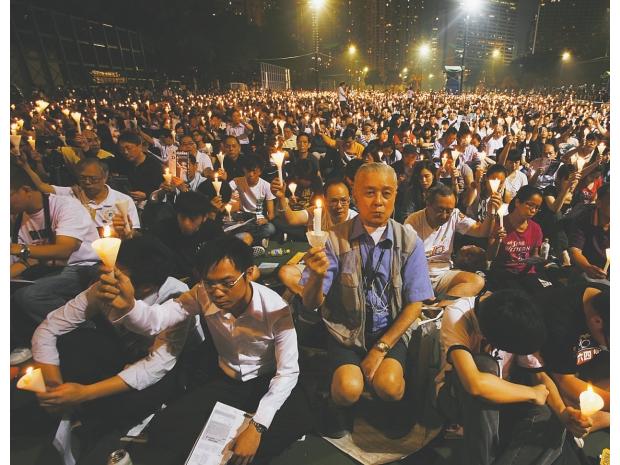Peter Brieger (AFP) June 4, 2010
HONG KONG --
Tens of thousands of Hong Kongers yesterday marked the bloody 1989 Tiananmen crackdown with a candlelight vigil, as agitation against
the autocratic Beijing regime intensifies in the former British colony which was
annexed by China in 1997 without any consent from Hong Kong people.
The annual event came after a week of controversy in Hong Kong--13 democratic activists were arrested on May 29 after police
had confiscated two "Goddess of Democracy" statues in the Times Square shopping district.
The statue emulated the papier-mache edifice that in 1989 became a symbol of the pro-democracy protests in Beijing, which were crushed by the army at the cost of hundreds, if not thousands, of lives.
In Tokyo, Wu'er Kaixi, one of the best-known Chinese student leaders of the Tiananmen protests, was arrested yesterday after entering the Chinese embassy.
The Hong Kong vigil, attended by as many as 150,000 people according to organizers, has become a touchstone for a movement calling for democracy in China and for
the Beijing regime to reverse its official verdict condemning the demonstrations as a counter-revolutionary uprising.
A sea of Hong Kong people packed Hong Kong's Victoria Park holding candles, singing, chanting and listening to music and short speeches calling for an end to the one-party state in China.
"I still remember," said a tearful Anson Ng, 42. "I remember the Chinese students, I remember the tanks."
Amy Lai, a clerk who came with her husband, said, "We came to remember Tiananmen Square, of course, but also to support democracy here
in Hong Kong -- that's very important to us."
In Beijing, China, black cars marked "special police," patrolled at regular intervals.
Near the vast Tiananmen square in Beijing, the police presence was far less heavy than for last year's 20th anniversary.
Democratic campaigners in Hong Kong are upset at what they say is Chinese interference in the democratic reform process in the territory, where elections are skewed in favor of pro-Beijing business elites.
The anniversary coincided with the publication of memoirs by a former Beijing insider, claiming China decided it had no choice but to "spill some blood" to preserve stability.
The phrase, attributed to Deng Xiaoping, the Paramount Leader, appears in a previously suppressed diary, which publishers say will lift the veil of secrecy over how the decision was made to send in the tanks on the night of June 3-4,
1989.
Leaked extracts of the diary, said to be written by Li Peng, the hardline former head of China's government in 1989, appeared yesterday.
According to the diary, Mr. Deng told officials on May 19, 1989, "The measures for martial law must be steady-handed, and we must minimize harm, but we must prepare to spill some blood."
Mr. Li, now 81 and reportedly in frail health, is said to have written his diary to justify his role in the killings and to counter the long-standing belief in China he pressured Mr. Deng into ordering the use of lethal force.
"From the beginning of the turmoil, I have prepared for the worst," he is quoted as saying.
The publishers said they taken every possible measure to assess the authenticity of the memoirs, which were acquired through a middleman, but admit some doubts remain. The book will be published next month.
